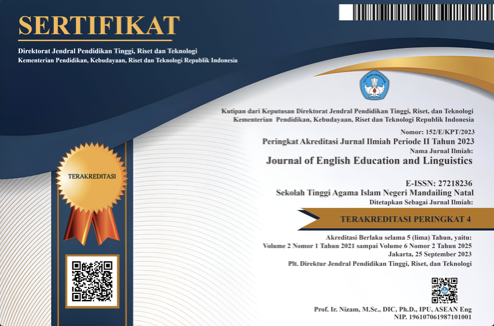Teachers’ Strategies in Giving Feedback on Students’ Speaking Performance
DOI:
https://doi.org/10.56874/jeel.v1i2.246Keywords:
Feedback, Speaking, Teachers strategyAbstract
This research was done because the researcher found several problems in teaching and learning speaking at school. The problems that the researcher found:Due to this phenomenon, the researcher wants to know about Teachers’ strategies in giving feedback on students speaking performance eleventh grade in SMAN 1 Canduang. The design of this research as descriptive qualitative. The informant of the research were the English teacher and the students at the eleventh grade in SMAN 1 Canduang. The researcher focused to class eleventh grade majoring in social 2. While techniques of data collection were observation and interview.The findings reveals that is teachers strategy in giving feedback on students speaking performance: feedback on the content, feedback on form, feedback during oral work, feedback during accuracy work, feedback during fluency work.
References
Arikunto, Suharsimi. 2006. ProsedurPenelitian; SuatuPendekatan Praktik.Jakarta: RinekaCipta.
Byrne, D. 1991. Technique for Classroom Interaction.Cambridge: Cambridge
Diaz, T, Lyne. 2004. Teaching English Learner Strategy and Method. America: Pearson Education
Diaz-Rico, T. Lyne. 2004. Strategies for Teaching English Learners, 2nd ed. Boston: Pearson
Education
Gay, L. R. 1990. Educational Research. Singapore: Mcrill Publishing Company
Harmer, Jeremy. 2001. The Practice of Language Teaching: England Person Education Limited.
Nunan, D. Practical English Language Teaching. Boston: McGraw Hill. 2003.
Lockart, Charles. Richard, Jack. 2007. Course in Language Teaching ReflectiveTeaching in Second Language Classroom. America Cambridge University Press.
Nunan, David. 2003. Practical English Language Teaching. Singapore: Mc Grow Hill.
Richard, Jack. 2001. Methodology in Language Teaching, An Anthology of Current Practice. New York: Cambridge Longman.
Richard, Jack. 2010. Longman Dictionary of Language Teaching and Applied Linguistics.Great Britain.
Downloads
Published
Issue
Section
License
All articles published in the Journal of English Education and Linguistics are licensed under a Creative Commons Attribution-ShareAlike 4.0 International (CC BY-SA) license. This means anyone is free to copy, transform, or redistribute articles for any lawful purpose in any medium, provided they give appropriate attribution to the original author(s) and Journal of English Education and Linguistics, link to the license, indicate if changes were made, and redistribute any derivative work under the same license.
Copyright on articles is retained by the respective author(s) without restrictions. A non-exclusive license is granted to the Journal of English Education and Linguistics to publish the article and identify itself as its original publisher, along with the commercial right to include the article in a hardcopy issue for sale to libraries and individuals.
Although the conditions of the Creative Commons Attribution-ShareAlike 4.0 International (CC BY-SA) license do not apply to authors (as the copyright holder of your article, you have no restrictions on your rights), by submitting to the Journal of English Education and Linguistics, authors recognize the rights of readers and must grant any third party the right to use their articles to the extent provided by the license.

This work is licensed under a Creative Commons Attribution-ShareAlike 4.0 International License.








